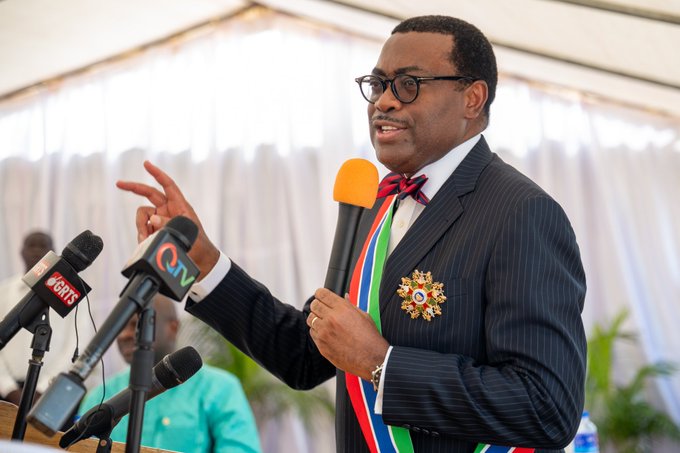The President of the African Development Bank (AfDB), Akinwunmi Adesina, has announced a significant milestone for West African infrastructure. Adesina confirmed that the AfDB, in collaboration with other institutions, is ready to mobilize $15 billion for the Lagos-Abidjan highway project.
He made this announcement in Abuja during the 90th birthday celebration of former Head of State, General Yakubu Gowon.
The highway, according to Adesina, is an essential link for the West African economy. He revealed that 80% of trade in the region is expected to pass through this route once completed.
Adesina stressed that the Lagos-Abidjan highway will not only improve trade but will also enhance transport connections between Nigeria and other West African countries.
In his words, “When completed, the corridor will enhance transport connections between Nigeria to the rest of the West African region.”
The project, overseen by the Economic Community of West African States (ECOWAS), will connect Nigeria, Benin, Togo, Ghana, and Côte d’Ivoire through a 1,068-kilometer highway.
Akinwunmi Adesina further shared details about the AfDB’s broader investments in infrastructure across Africa.
He said the bank has invested heavily in key sectors over the past eight years, contributing over $55 billion towards infrastructure development. These investments include roads, transport corridors, seaports, airports, and other crucial infrastructure.
“To strongly support African social and economic growth, the African Development Bank invests heavily in infrastructure,” Adesina noted.
One notable project he highlighted was the $389.3 million investment in the highway connecting Enugu in Nigeria to Bamenda in Cameroon. This investment, he said, is part of the bank’s efforts to improve connectivity in the region.
The AfDB also invested over $40 million in the Lekki toll road project to reduce traffic congestion and lower transportation costs in Lagos, Nigeria’s commercial hub.
“We have invested $49.5 million in the Lekki toll road, easing traffic and lowering transport costs,” he said.
The Lagos-Abidjan highway project is being hailed as a game-changer for West Africa. This massive infrastructure initiative is designed to connect five West African countries—Côte d’Ivoire, Ghana, Togo, Benin Republic, and Nigeria.
The highway will start at Eric Moore in Lagos, Nigeria, and end in Abidjan, Côte d’Ivoire, passing through eight border towns.
Once completed, the highway is expected to carry over 500,000 passengers daily. This will significantly boost trade, tourism, and economic activities across the region, making it easier for goods and people to move freely between countries.
Adesina emphasized the importance of this project for regional integration. “The corridor will strengthen trade and economic ties between Nigeria and the rest of West Africa,” he said.
The project is part of a larger plan by ECOWAS to connect major cities across West Africa through road networks. The Lagos-Abidjan corridor is also a key segment of the broader Dakar-Lagos Corridor, which stretches from Senegal to Nigeria.
The African Development Bank has consistently played a pivotal role in financing large-scale infrastructure projects across the continent.
Adesina revealed that the bank had already provided $12.6 million to support a feasibility study for the Lagos-Abidjan corridor.
In addition to the highway project, the AfDB is also investing in other infrastructure projects across West Africa. The bank is currently mobilizing support for the development of a railway line connecting Kano in northern Nigeria to Maradi in Niger Republic.
These projects align with the AfDB’s commitment to driving sustainable economic growth in Africa by improving infrastructure, promoting trade, and creating jobs.
Adesina believes that these investments will help unlock the region’s potential, enabling countries to tap into new economic opportunities.
“To support African development, the bank has invested in various sectors, from roads and highways to seaports and regional power transmission networks,” he stated.
Once completed, the highway will enhance economic ties between Nigeria and its neighbors, making it easier for businesses to expand their operations across borders.
The AfDB’s commitment to mobilizing $15 billion for this project is a testament to the bank’s dedication to promoting regional integration and economic growth.
As Akinwunmi Adesina said during his speech, “This is not just about building roads; it is about connecting people, economies, and opportunities across West Africa.”
The Lagos-Abidjan highway is one of the largest infrastructure projects in West Africa. With the AfDB leading the charge, the project is expected to be a major driver of economic growth in the region.
However, the road to completion is not without challenges. The project requires extensive funding, and the collaboration of multiple governments and institutions.
But with the commitment of the AfDB and other partners, there is hope that the project will be completed on time and on budget.
In the words of Akinwunmi Adesina, “We are committed to mobilizing the resources necessary to make this project a reality.”
The Lagos-Abidjan highway will be a lifeline for the West African economy, connecting millions of people and creating new opportunities for trade, tourism, and development.

